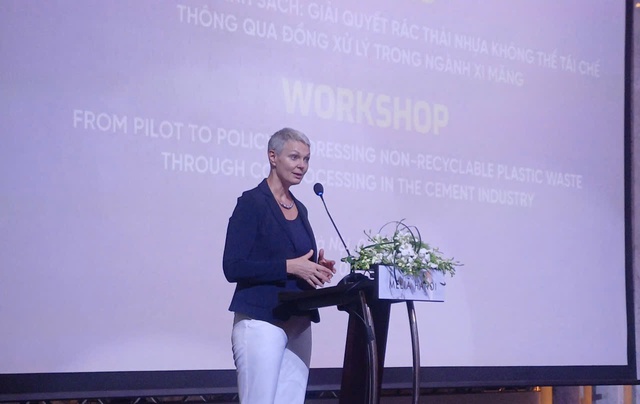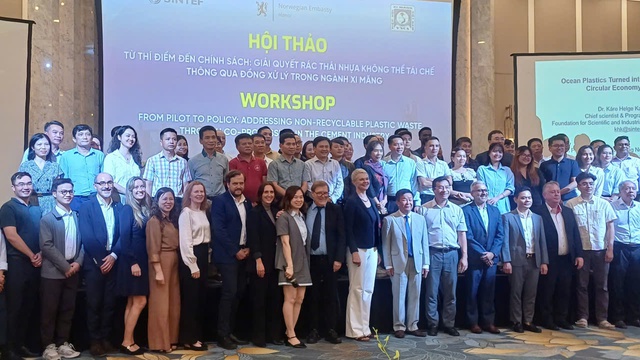Norway helps Viet Nam tackle plastic wastes through co-processing
VGP - A workshop themed “From pilot to policy: addressing non-recyclable plastic waste through co-processing in the cement industry” took place in Ha Noi on October 10.

Norwegian Ambassador to Viet Nam Hilde Solbakken addresses the workshop - Photo: VGP/Thuy Dung
The event was co-organized by the Norwegian Foundation for Scientific and Industrial Research (SINTEF), the Royal Norwegian Embassy in Ha Noi and the Viet Nam National Cement Association (VNCA).
The event marked the official conclusion of the Ocean Plastic Turned into an Opportunity in Circular Economy Project (OPTOCE Project) funded by the Norwegian Government.
The workshop brought together over 100 participants, including policymakers, industry leaders, researchers, international organizations and development partners, to discuss and reflect on OPTOCE's achievements and explore how co-processing can be scaled to address plastic leakage, reduce coal dependency in the cement industry, and cut greenhouse gas emissions.
Viet Nam is one of the countries most affected by marine plastic waste and is also striving to meet its net-zero target for greenhouse gas emissions by 2050 and fulfil its commitments under the Just Energy Transition Partnership (JETP).
The nation faces a dual challenge: surging plastic waste and rising carbon emissions. Rapid urbanization and consumption have led to increasing volumes of non-recyclable plastic, much of which risks leaking into rivers and oceans, threatening marine ecosystems and coastal livelihoods.
Co-processing offers a scalable solution by safely treating these plastics in cement kilns, preventing marine litter while replacing fossil fuels in industrial processes.
In her opening remarks, Norwegian Ambassador to Viet Nam Hilde Solbakken said, through OPTOCE, science-based solutions like co-processing can transform plastic waste into a resource that benefits the climate, the economy, and communities.
Norway remains committed to scaling this approach in Viet Nam and across the region, especially in the context of our partnership under JETP, she added.

Participants to the workshop - Photo: VGP/Thuy Dung
Chief Scientist and Program Manager of OPTOCE Kåre Helge Karstensen held that more than six years ago, OPTOCE was launched as a regional initiative in five countries, including Viet Nam, and later expanded to eight countries across Asia.
Its success demonstrates that co-processing non-recyclable plastics in cement kilns is not only technically feasible and environmentally sound but also capable of delivering rapid, large-scale impact. The next step is to move beyond pilots and integrate this solution into national policy frameworks to drive systemic change, he added.
The workshop featured several presentations and a panel discussion focusing on the legal framework, potential waste supplies, as well as the practices and challenges in implementing co-processing in Viet Nam.
The presentations focused on the analysis of the new technical regulations, current waste streams suitable for co-processing, barriers in the cement industry, and practical experience from cement plants.
The panel discussion further highlighted opportunities, challenges, and solutions to integrate co-processing into the National Waste Management Strategy.
Building on the results of the OPTOCE Project, participants emphasized that co-processing is a feasible solution that delivers environmental, economic, and climate benefits.
They stressed the need to expand the model in Viet Nam by improving the policy framework, promoting innovative solutions and technologies, and developing investment-ready models./.
